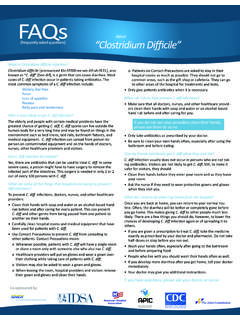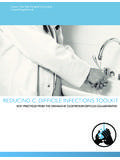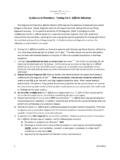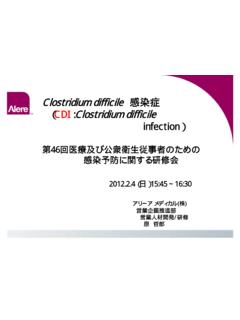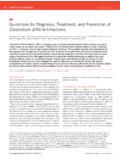Transcription of BROCKTON AREA MULTI-SERVICES, INC. MEDICAL …
1 Page 1 of 4 BROCKTON AREA multi - services , INC. MEDICAL PROCEDURE guide Subject: clostridium difficile (C- diff ) Date Developed: 6/2010 Date(s) Reviewed/Revised: PROTOCOL FOR: All staff PURPOSE: To provide guidance for employees in order to prevent the spread of C- diff among individuals, employees, and the environment. C- diff is a bacteria normally found in the bowels. It can develop into an infection called C- diff colitis if other normal bacteria in the bowel are eliminated or significantly reduced, usually through the use of antibiotics. It is considered to be an opportunistic bacterium that is usually under control in the bowel by other bacteria. These bacteria can cause problems when the body s resistance to infection is diminished, or other helpful bacteria have been destroyed by antibiotics.
2 Common symptoms of C- diff include: Large, watery, foul smelling diarrhea - 10 or more BMs a day Fever greater than 101 degrees Severe abdominal pain Blood, pus, or mucus-like substance in the stool Nausea Decreased urine output, signs of dehydration Those individuals at risk for contracting C- diff usually have had a recent hospitalization, have been on antibiotics, have a weakened immune system, and are over 65 years of age. Because clostridium difficile are part of the normal flora (bacteria) of the GI system, most infections from these bacteria are part of the individuals own flora. C- diff can be transmitted via the fecal-oral route, and can be transmitted from contaminated articles or food by direct contact with such articles by an at-risk individual or indirectly by a staff person who does not comply with thorough hand washing, hygiene, housekeeping, and other infection control measures.
3 C- diff is contagious and is easily spread. Special Considerations for the individual with C- diff : The individual s physician shall determine whether the C- diff represents colonization or an active infection, and shall order treatment as necessary. Consultation with an infectious disease specialist may occur if indicated. Page 2 of 4 BROCKTON AREA multi - services , INC. MEDICAL PROCEDURE guide Subject: clostridium difficile (C- diff ) Date Developed: 6/2010 Date(s) Reviewed/Revised: 1. Treatment with antibiotics may be ordered as indicated for infected or colonized individuals by their physician. Treatment is usually with flagyl and or vancomycin. 2. Management of severe infection usually requires hospitalization for treatment with antibiotics.
4 3. Two negative cultures indicate the individual is free of infection colonization. 4. Participation in normal living activities should be encouraged as appropriate. 5. Individuals with C- diff infection or colonization shall not be refused placement/ services solely on the basis of his or her C- diff status. 6. In order to attend Day Habilitation Program, the individual must have two negative cultures. 7. The Program Nurse is responsible for providing staff training, including issues and concerns specific to the individual with C- diff . Standard Precautions: Hand washing and adherence to standard precautions remain the most important measures in controlling the spread of disease, including the spread of C- diff .
5 HAND SANITIZER IS NOT EFFECTIVE AGAINST C- diff . A. Practice of standard precautions includes: 1. Thorough hand washing before donning gloves and immediately after gloves are removed. 2. Thorough hand washing between caring for individuals. 3. Use of gloves when caring for individuals whenever contact with wounds, sores, stool, mucous membranes, or other body substances is anticipated. 4. Use of gowns whenever care activities may generate splashes and sprays. 5. Masks and eye protections during any activities that may generate splashes and sprays. Page 3 of 4 BROCKTON AREA multi - services , INC. MEDICAL PROCEDURE guide Subject: clostridium difficile (C- diff ) Date Developed: 6/2010 Date(s) Reviewed/Revised: B. Equipment 1. Equipment ( , thermometers, commodes, toilets etc.)
6 Should be dedicated for the person infected with the bacteria whenever possible, especially when use of disposable equipment is not feasible. 2. Non-dedicated or non-disposable equipment shall be disinfected after every use by or exposure to the individual and prior to use by another individual using a bleach solution 1:100 dilution. C. Housekeeping and Laundry 1. Linens and personal clothing: minimal handling of soiled linens should be stressed. Staff involved in stripping beds or otherwise have direct contact with these materials should wear gowns and gloves. Soiled linens and clothing should be double bagged in the individual s room, then washed with laundry detergent in warm water and dried in a hot dryer.
7 2. The cleaning of toilets and bathroom fixtures is very important when individuals share the same bathroom. Cleaning is to be done after every use of the bathroom with bleach solution 1:100 dilution. 3. If an individual has or is experiencing a gross amount of loose stool, a commode should be considered or separate bathroom if available. 4. Ensure that personal items and all household surfaces are cleaned and disinfected after every use by or exposure to the individual with a bleach solution 1:100 dilution. 5. Disposable mop heads and wipes should be used whenever possible when cleaning. 6. Infectious waste should be double bagged in the room in which it was created. An individual s hands are to be washed with soap and water after every bathroom use, and before meals.
8 Always monitor the individual with C- diff closely, and monitor the other individuals in the house as well. Page 4 of 4 BROCKTON AREA multi - services , INC. MEDICAL PROCEDURE guide Subject: clostridium difficile (C- diff ) Date Developed: 6/2010 Date(s) Reviewed/Revised: Call 911 if the individual: Looks very sick Won t wake up Has chills or is shaking or a high fever Is confused or disoriented Has low blood pressure and a fast heart rate Has a significant decrease in urine output DOCUMENTATION Call the individual s physician, notify the Program Nurse or Program Manager and document in the required paperwork, if the individual has: (especially if the person is elderly or very ill) More than 3 BMs in a day Severe pain or cramping Decreased urine output Blood or pus in stool


